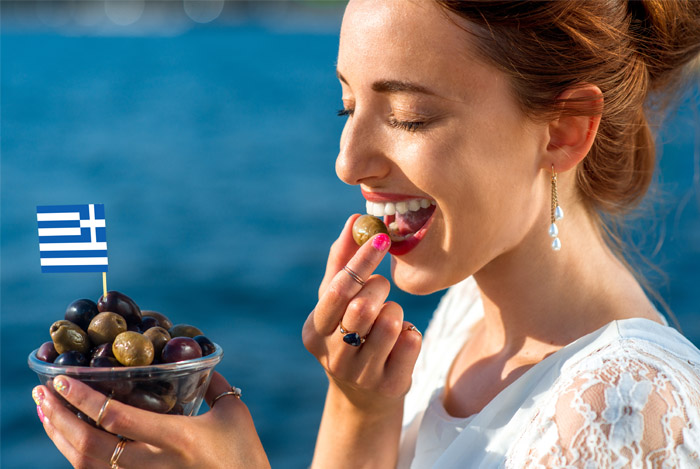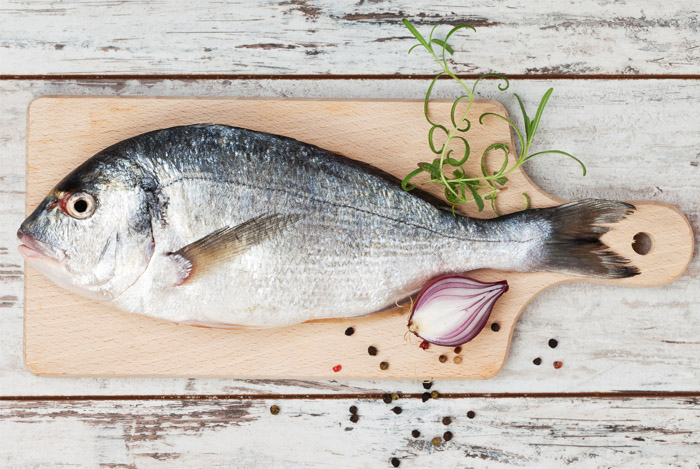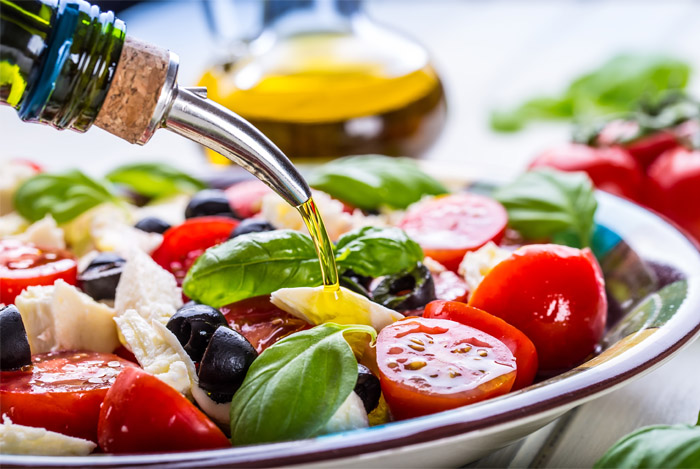If you thought the Mediterranean Diet was just a fad diet, guess again.
This healthy eating plan mimics the dietary lifestyle of those living along the Mediterranean coast—and it’s not going anywhere.
In fact, its emphasis on fresh fruits, veggies, legumes, fish, and monounsaturated fat like olive oil; and its limited inclusion of red meat, dairy, and saturated fat, make it one of the healthiest diets in the world.
Following a Mediterranean Diet has already been scientifically proven to:
- Protect against diabetes
- Prevent heart disease and stroke
- Fight cancer
- Reduce asthma symptoms
- Help you lose weight
- Increase your longevity
Now the big news is that this diet can also protect that big beautiful brain of yours!
See, our brains naturally shrink as we age, which means we increase our risks of developing dementia, Alzheimer’s disease, strokes, and memory loss.
According to research by Yian Gu of Columbia University in New York, the Mediterranean Diet can improve your memory and thinking skills and keep your brain from shrinking.
“The lack of effective treatments for cognitive decline and dementia points to the need of preventive strategies to delay the onset and/or minimize the effects of these devastating conditions.”
I couldn’t have said it better myself. Let’s discuss what Gu learned in his study and see exactly why a Mediterranean Diet is tops for your brain.
The Mediterranean Diet Takes 5 Years Off Your Brain

Gu led a study of 674 healthy elderly adults who had normal brain function.
By analyzing their food surveys and using MRIs to scan their brains for over a year, he was able to correlate those following a Mediterranean diet with having larger brain volume and more gray matter volume.
Gu calculated that the health effects of eating at least five of the recommended Mediterranean Diet components had an association that was similar to taking five years of aging off your brain!
When I read about these results, I was more than intrigued. So I had to do some digging to discover what specifically makes the Mediterranean Diet responsible for protecting our brains.
More Fish, Less Meat

Mediterranean dieters typically eat more fish and less meat. Coincidentally, eating less meat was also shown to match up with larger total brain volume.
“Eating at least three to five ounces of fish weekly or eating no more than 3.5 ounces of meat daily may provide considerable protection against loss of brain cells equal to about three to four years of aging,” Gu said.
Well, this actually makes a lot of sense
Fatty fish are full of omega-3 fatty acids, which your body uses to build cell membranes in your brain.
Alpha-linolenic acid, or ALA, is the specific omega-3 found in fish such as:
- Sardines
- Salmon
- Trout
- Mackerel
- Tuna
Let’s take it a step further now. ALA produces docosahexaenoic acid, or DHA, another fatty acid that’s responsible for building up the cell walls in your brain, too.
Ernst Schaefer, M.D., of Tufts University, said that we typically produce less DHA as we age, which may be why our cognitive abilities also decline.
According to Schaefer’s nine year study of 900 elderly participants, consuming three servings of fish per week led to reduced risks of Alzheimer’s and dementia.
You know what else fatty fish is awesome for?
Vitamin D—the sunshine vitamin that also protects your brain.
Neuroscientist David Llewellyn of the University of Cambridge assessed vitamin D levels in more than 1,700 participants aged 65 and older. He found that when subjects had lower vitamin D levels, they also performed negatively on mental tests.
Those with the lowest vitamin D levels “were more than twice as likely to be cognitively impaired.”
Cognitive impairment leads directly to Alzheimer’s and dementia.
Healthy Fats and Nuts

Usually when someone has a high risk of heart disease, they also have a higher risk of dementia.
During one study of volunteers in Spain who were pretty much following a Mediterranean diet already, researchers chose 447 participants with an average age of 67 who were at risk of developing heart disease and split them into three groups.
One group was told to add 5 tablespoons of extra virgin olive oil (EVOO) to their diet, another a handful of mixed nuts, and the third was just following a low-fat dietary plan.
The participants were brought in to test their memory skills every so often.
The group adding EVOO did better on tests requiring quick thinking. A very minimal percentage, just over 13%, of the participants adding EVOO were diagnosed with “mild cognitive impairment which may or may not lead to Alzheimer’s.”
Researchers discovered that the group who added nuts to their diet had better working memory. Only 7% of the participants in this group were diagnosed as having mild cognitive impairment.
More importantly, 13% of participants in the group without fats and nuts developed memory loss the same time patients from the other two groups actually saw improvements in their memory, thinking, and problem-solving skills.
“Our results suggest that in an older population a Mediterranean diet supplemented with olive oil or nuts may counteract age-related cognitive decline,” Dr. Emilio Ros of the Institut d’Investigacions Biomediques at Hospital Clinic, Barcelona, wrote.
So if you’re looking for brain-loving nuts, look no further than walnuts. They not only look like little brains, but they’re also amazing for them.
During one analysis, researchers learned that a diet supplemented with walnuts improved brain performance for adults taking a series six cognitive tests.
I’d credit these results with the fact that walnuts are full of healthy fat and antioxidants, which is pretty typical of foods on the Mediterranean Diet.
Tons of Antioxidants

Our bodies absorb free radicals from pollutants in the environment, harmful food additives we eat, and even certain medications we take.
Free radicals cause havoc in your body and start damaging your cells, creating excessive oxidative stress for your body to deal with. This damage can kill brain cells and cause our brains to shrink.
This is not a ‘size matters’ kind of thing. Damaging degenerative changes to your brain can lead to decreased learning, memory impairment, and unsteady motor functions, which are hallmarks of diseases such as Parkinson’s and Alzheimer’s.
Oxidative stress starts when you’re young and you’re body can stay on top of it, but it accumulates as you age and then it’s a serious problem.
Unless you start preventive care with a diet focused more on fruits and vegetables: antioxidant powerhouses.
Antioxidants, by definition, prevent or slow cell damage and fight against free radicals.
Bonus: One of the best place to find antioxidants is in a veggie and fruit friendly eating plan such as the Mediterranean Diet.
See, plants synthesize compounds called anthocyanins, which are what gives fruits their many different colors. They protect the plant from the sun’s damaging UV rays so it can use the sun for growth instead.
They’ll also protect you from cell damage so you can thrive.
Anthocyanins are one of the most potent antioxidants you can stuff in your diet; they reduce the effects of oxidative stress and prevent damage, sometimes even reversing it!
Since the Mediterranean Diet is so fruit and veggie focused, it’s easy to see why following one has been associated with a higher total antioxidant capacity.
You’ll find antioxidants in:
- Dark green, leafy veggies such as spinach and mustard and turnip greens
- Cruciferous veggie all stars like broccoli, cauliflower, and kale
- Asparagus, bell peppers, carrots
- Fruit such as cantaloupe, citrus, pineapple, berries, tomato, grapes, black currant
- Almonds, sunflower seeds, pecans, hazenuts
- Herbs like oregano, basil, thyme, ginger
- Green tea
Seems like I’m missing one very important antioxidant… olive oil.
Yes, this healthy fat also has antioxidant properties—and it’s one ingredient you’ll find in almost every Mediterranean recipe.
Extra virgin olive oil is so powerful that research has shown that it actually prevents cancer cells from rapidly spreading, moving, or invading nearby areas.
It’s even been noticed to “induce cell death” in cancerous cells.
Not to mention that EVOO has been revered for its ability to prevent “conditions related to coronary disease [and] stroke,” according to Medical News Today.
“Typically, what’s good for the heart is good for the brain,” says Michelle M. Mielke, PhD, associate professor in the department of health sciences research at the Mayo Clinic whose research focuses on Alzheimer’s disease and other neurodegenerative conditions.
Let’s not forget that it wouldn’t be a diet from the Mediterranean if it didn’t include a glass of wine occasionally.
While obviously drinking in excess is going to destroy your brain cells, drinking in moderation is actually healthy for you.
According to one study, the antioxidant EGCG that’s found in red wine—and also found in green tea, the healthiest drink in the world—helps prevent beta-amyloid proteins from destroying brain cells.
Let’s cheers to that!
The Mediterranean Diet is really a diet about common sense:
Choosing healthy fats, eating more fruits and veggies instead of sugar, and sticking with fish will certainly make you healthy and a few pounds lighter as long as you eat these foods in moderation (another smart tip).
But now it’s even more important than ever to start protecting your brain with these foods since cognitive decline is on the rise.
It’s kind of ironic that a diet that’s a no-brainer may actually be the best thing for your brain!
Is your brain telling you to go Mediterranean? Share your thoughts about brain health with me in the comments.
And don’t forget to check out these Mediterranean Meal Plans for some great recipes and tips!
The post Save Your Brain with a Mediterranean Diet appeared first on Nutrition Secrets.
http://www.nutritionsecrets.com/save-your-brain-with-a-mediterranean-diet/
No comments:
Post a Comment